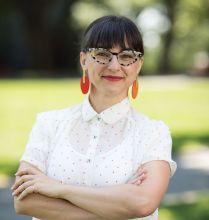-

Hear from Professor Monica Toft
Learn how Professor Monica Toft is shaping the study of global affairs and diplomacy at Fletcher.
Hear from Prof. Toft -

Explore Fletcher academics in action
Fletcher Features offers insights, innovation, stories and expertise by scholars.
Get global insights -
Get application tips right from the source
Learn tips, tricks, and behind-the-scenes insights on applying to Fletcher from our admissions counselors.
Hear from Admissions -

Research that the world is talking about
Stay up to date on the latest research, innovation, and thought leadership from our newsroom.
Stay informed -
Meet Fletcherites and their stories
Get to know our vibrant community through news stories highlighting faculty, students, and alumni.
Meet Fletcherites -

Forge your future after Fletcher
Watch to see how Fletcher prepares global thinkers for success across industries.
See the impact -

Global insights and expertise, on demand.
Need a global affairs expert for a timely and insightful take? Fletcher faculty are available for media inquiries.
Get in Touch
Alicia Pérez-Porro, PhD, MSc. (GMAP 21)
Marine biologist, environmentalist and gender equity activist shares her thoughts about diversity and inclusion in the scientific world and why climate action must include the oceans.
On advocating for women in leadership roles within the sciences
I am very interested in the connection between climate science and gender equality. Since the coronavirus pandemic started we have been aware of the importance of science informed solutions and science informed policies when it comes to a problem with a big scientific component. Environmental problems also fall in that category. But who makes the science that is informing those policies? Men. Particularly white men from the global north. Scientists are not pure beings, we have our biases, and those biases are passed to our science inevitably. That's one of the many reasons why diversity and inclusion are so important in science. To have robust science informed solutions and policies we need science with as many perspectives as possible, and that of course includes more women doing science.
If we think about the IPCC, which is the most recognized scientific panel influencing international climate policies, most of the authors are still men from the global north. Some progress was made, for instance in the latest IPCC AR6 WGII published last February 57% of the authors were from developing countries, and 41% of the total number of authors were women. But the numbers were still far away from being ideal in the IPCC AR6 WGIII published last April, where only 41% of the authors were from developing countries and only 29% of the total authors were women.
On the connection between climate action and the oceans
Her Deepness, Dr. Sylvia Earle, said the most clever piece of wisdom, and in the most clever way, when it comes to the connection between climate action and the ocean, "no blue, no green." Because 70% of the surface of our planet is water, it should be called planet ocean instead of planet earth. The same way that climate action is not going to be successful without gender equality, without including the ocean in climate action we are also going to fail. It is like a table with three legs, with only one or two legs, the table doesn't stand.


